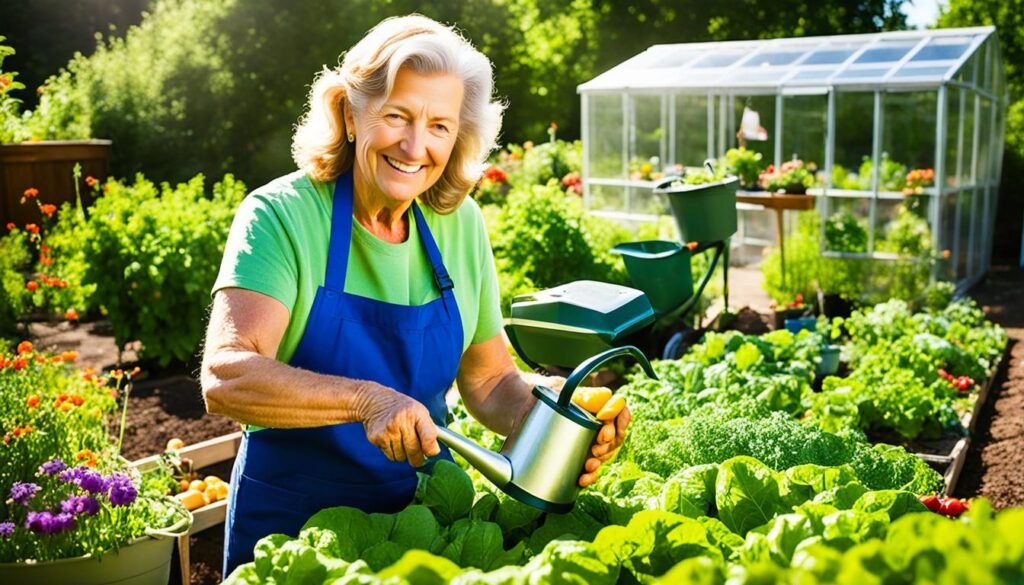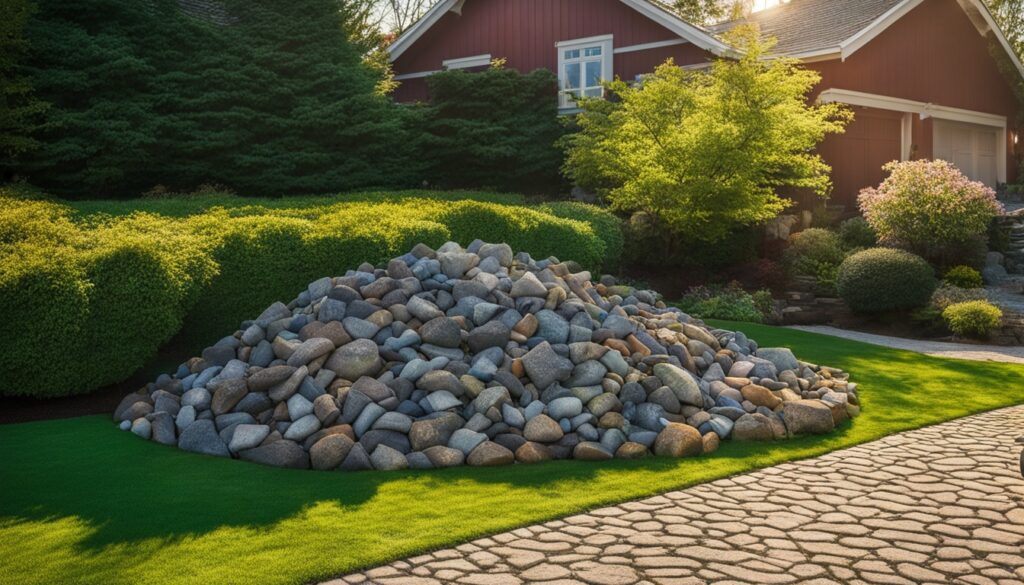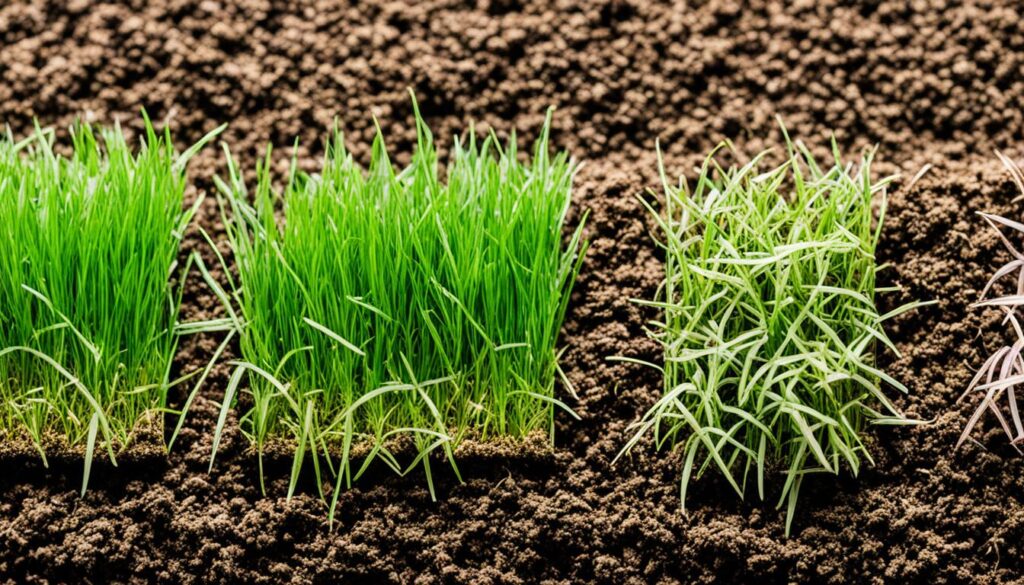About one-third of U.S. households grow their own food, with vegetable gardens being the top choice. The COVID-19 pandemic made more people want to grow their own food in 2020. They wanted to have fresh, healthy produce right at home.
Growing vegetables is more than just about food. It can make you healthier, help you save money, and connect you with nature. Vegetable gardening brings many benefits to your life. It can increase your fruit and vegetable intake, reduce stress, and teach your kids important skills.
Key Takeaways
- Vegetable gardening provides fresh, nutrient-rich produce to improve your health
- Growing your own food can save you hundreds of dollars on your grocery bills
- Gardening is an eco-friendly, sustainable activity that reduces your environmental impact
- Tending to a garden offers an enjoyable form of physical exercise and stress relief
- Vegetable gardening teaches children valuable life skills, from healthy eating to food production
Improve Your Health with Fresh Produce
Growing your own vegetables can greatly improve your health. Vegetables picked straight from your garden are more nutritious than those bought in stores. They haven’t been stored or transported for days or weeks. Studies show kids who eat homegrown fruits and veggies are more likely to get the recommended 5 servings a day.
Higher Nutritional Content
Fresh vegetables from your garden taste amazing because of their variety and timing. Homegrown, organic food tastes better because of the right plant choices, crop rotation, and letting crops ripen fully. These veggies also have compounds like sulfurane that fight diseases and boost health.
Increased Fruit and Vegetable Consumption
Growing your own veggies makes you eat more fresh, healthy foods. The American College of Lifestyle Medicine says eating lots of fruits and veggies lowers heart disease risk and blood pressure. It also helps prevent some cancers. With your own garden, you’ll always have fresh, tasty options to eat more healthily.
“To boost immune function, fruits and vegetables rich in vitamins C and A can strengthen the immune system.”
Fruits and veggies are packed with vitamins, minerals, fiber, and antioxidants. These nutrients help your body work right and fight off diseases. Antioxidants and phytochemicals in these foods reduce inflammation. This lowers the risk of heart disease, cancer, and diabetes.
Save Money on Groceries
Growing your own vegetables can cut down your grocery bills. The average American family spends about $550 a month on food, a big part of which goes to fresh fruits and veggies. By growing your own, you can enjoy homegrown food without the high store prices. Even a small garden can give you a big harvest, saving you hundreds a year on groceries.
In Iowa, you can grow cool and warm-season vegetables, making two or three crops possible in one season. With good planning, you can use your garden space well and save more on your grocery bills.
For the best savings, grow veggies that last long or can be canned or frozen. Tomatoes, melons, beans, beets, onions, spinach, broccoli, peppers, carrots, summer squash, cucumbers, potatoes, lettuce, peas, and Swiss chard are great choices. They’re often bought and can save you a lot of money and time.
Herbs are another way to save money, as they’re pricey in stores but can be grown for years. Lettuce and salad greens are also cheap to start and give you lots of seeds for your garden.
Items like bell peppers, mini sweet peppers, melons, sweet potatoes, and berry bushes are expensive in stores but easy and cheap to grow at home. These can be a big money-saver if you grow them yourself.
“Even a small backyard vegetable garden can provide a bountiful harvest, potentially saving you hundreds of dollars on your annual grocery expenses.”
By using your garden to save money, you can lower your grocery expenses and enjoy the taste and quality of homegrown food. With some planning and effort, your garden can be a key part of saving money.
Eco-Friendly and Sustainable Living
Growing vegetables is good for the planet, especially if you do it organically. By growing your own food, you cut down on carbon emissions. You don’t need to transport store-bought fruits and veggies. Plus, organic gardening protects the soil, air, and water, making the environment healthier.
Reduce Environmental Impact
By growing your own food, you lessen your dependence on big agriculture. This means less use of harmful pesticides, fewer emissions from transportation, and less water waste. Using smart watering methods like drip irrigation saves even more water.
Plants are key in fighting climate change by taking in carbon dioxide and making oxygen. By gardening, you help absorb more carbon dioxide, which is good for the planet.
Minimize Food Waste
Growing your own veggies means you only take what you need, cutting down on waste. You can compost or share any extra, helping the environment. Composting kitchen and yard waste makes a great fertilizer for your garden.
By growing your own food, you eat fresher, healthier produce. This leads to less food waste. Plus, you’re less likely to throw away food from your garden than store-bought items.
Sharing garden surplus with neighbors, donating to food banks, or preserving for later helps the community. It shows how gardening can bring people together and make a difference.
“Vegetable gardening is a powerful tool for creating a more sustainable and eco-friendly lifestyle. By growing your own produce, you can significantly reduce your environmental impact and contribute to a healthier, more connected community.”
Enjoyable Physical Activity and Exercise
Gardening is a great way to stay active and fit. It involves bending, stretching, and lifting, which can be a good workout without needing a gym. Research shows that gardening can raise your heart rate and burn calories, making you more energetic.
Tasks like carrying heavy items and pulling weeds help build muscle strength. This can improve your overall strength. Gardening also helps with balance and flexibility by requiring you to move in different ways.
It’s important to start slowly and take safety steps to avoid getting too tired. This includes warming up, drinking plenty of water, and protecting yourself from the sun.
Doing gardening for 10 minutes a day can meet the weekly exercise goal of 150 minutes. It can lower the risk of many health problems, like heart disease and diabetes. Plus, it can make your mind sharper, reducing dementia risk by 36 percent.
Gardening is not just good for your body. It’s also a fun hobby that can reduce stress and boost your mood. Being in nature and seeing your garden grow can make you feel proud and happy.
| Gardening Activity | Calories Burned per Hour |
|---|---|
| Planting seedlings or raking | 149 calories |
| Weeding | 172 calories |
| Digging and spading | 186 calories |
| Mowing with a push lawn mower | 205 calories |
Gardening can help burn 250-500 calories per hour, depending on the activity.
Gardening is a great way to be active and feel connected to nature. It offers many benefits, from fitness to stress relief. Whether you’re new to gardening or have been doing it for years, it’s a rewarding hobby.
Stress Relief and Connection with Nature
Gardening is a great way to relax and feel connected to nature. Taking care of plants, inside or outside, can calm your mind. Being in the garden lets you enjoy nature’s beauty, sounds, and smells. This can make you feel better mentally.
Watching your plants grow gives you a sense of purpose and happiness. It also makes you appreciate the world around you more.
A study from 2013 showed how gardening can be good for the economy. In 2017, a study looked at Vitamin D levels and jobs. It found that being outside is key to keeping Vitamin D levels healthy.
Gardening takes your mind off daily worries and helps you focus less on problems. It also gets you moving, whether it’s light work or heavy tasks. This can make you feel happier by releasing endorphins.
“Spending just 20 minutes a day in nature can help individuals feel more relaxed and lift their mood.”
Being in the garden with family, sharing food with friends, or helping in community gardens can make you feel happier. Touching soil can also lower stress and boost your mood. This is because soil has bacteria that make serotonin.
Gardening is good for kids too. It gets them moving, eating healthy, making friends, and learning about nature. Growing their own food can lead to better eating habits and less sugar intake, which can reduce anxiety.
Teach Children Valuable Life Skills
Getting kids involved in vegetable gardening changes their lives. It teaches them important skills they’ll use now and later. By taking care of their plants, they learn where their food comes from. They also start good habits about healthy eating.
Encourage Healthy Eating Habits
Kids who grow their own food are more likely to eat new fruits and veggies. This leads to better nutrition and healthy eating habits for life. Gardening also helps them stay active, burning 250-500 calories per hour.
Develop Social and Interpersonal Skills
Gardening is great for social skills too. Working together in the garden teaches kids about teamwork, talking, and solving problems. Seeing their hard work pay off boosts their confidence and connects them with nature.
| Key Life Skills Learned from Gardening | Benefits |
|---|---|
| Responsibility | Children learn to care for their plants, developing a sense of ownership and pride in their work. |
| Patience | Watching seeds grow into mature plants teaches children the value of delayed gratification. |
| Problem-Solving | Kids must navigate challenges like pests, weather, and plant care, honing their critical thinking skills. |
| Sustainability | Gardening fosters an appreciation for the environment and the importance of sustainable practices. |
By letting kids help with vegetable gardening, parents and teachers open up a world of learning. This activity teaches them about healthy eating and important life skills. The benefits of this activity are endless.
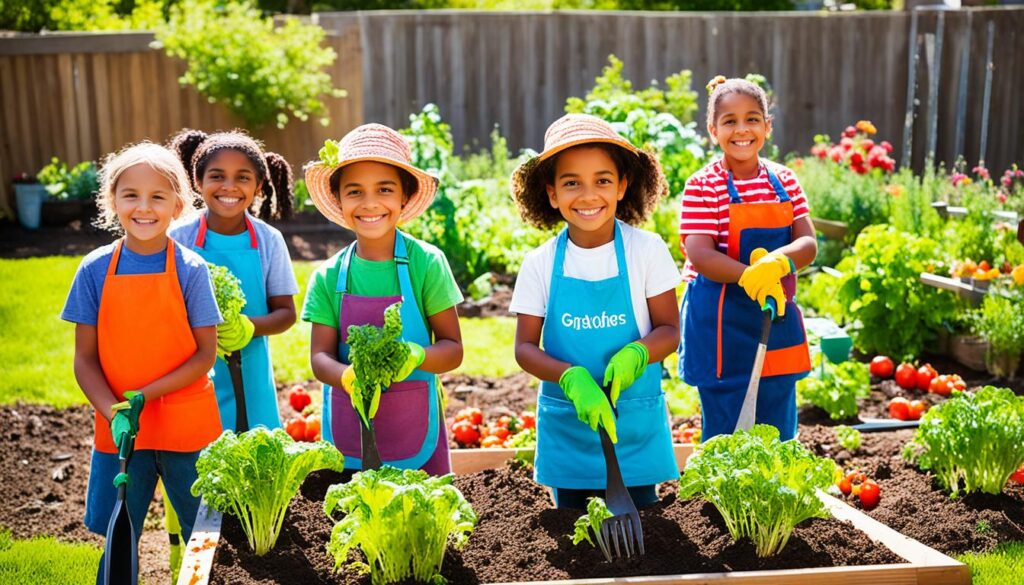
“Gardening is a great way to teach children about the importance of healthy eating and the value of hard work. It’s a skill that will benefit them throughout their lives.”
Homegrown, Organic, and Sustainable Food
Growing your own organic produce lets you control the food’s quality and how it’s made. You can avoid synthetic chemicals, making sure your fruits and veggies are safe. Homegrown food skips the processing and storage that can lower its nutritional value.
Vegetable gardening supports a sustainable food system. It cuts down on industrial farming and gives you a steady supply of fresh, healthy organic produce for your family.
Using farming practices like integrated pest management and companion planting helps your garden thrive. These methods also protect the environment. Techniques like mulching and polyculture farming boost soil health and improve the food quality and security of your garden.
By choosing these eco-friendly ways, you get nutritious, chemical-free food. You also help make our food system more sustainable.
| Benefit | Impact |
|---|---|
| Organic Gardening | Reduces exposure to harmful chemicals and preserves nutrient content |
| Sustainable Farming Practices | Enhances soil health, biodiversity, and environmental sustainability |
| Homegrown Produce | Provides a reliable source of fresh, high-quality food for you and your family |
Choosing homegrown, organic, and sustainable food production leads to a healthier lifestyle. It also helps shape the future of our food system.
what benefits does vegetable gardening give
Starting a vegetable garden brings many advantages to your life. It makes you healthier with fresh, nutrient-rich food and helps you save money on groceries. Growing your own food is truly amazing.
One big plus is getting to eat the best, home-grown food. Produce picked fresh tastes better and is more nutritious than what you buy in stores. You can trust the food you grow, avoiding harmful chemicals and preservatives.
Growing vegetables is also good for the planet. It cuts down on the need for store-bought food, helping the environment. Plus, using what you grow reduces food waste, making gardening even better for the earth.
Vegetable gardening is great for your body and mind too. It’s a workout that helps you relax and feel good. Feeling proud of your garden and being close to nature boosts your happiness.
For kids, gardening is a chance to learn important skills. It teaches them about healthy eating and helps them grow socially. It’s a special way for them to learn and have fun.
The benefits of vegetable gardening are many. They cover health, money, the planet, and learning. Whether you want to eat better, save cash, or just enjoy a hobby, gardening with your own produce can make life better.
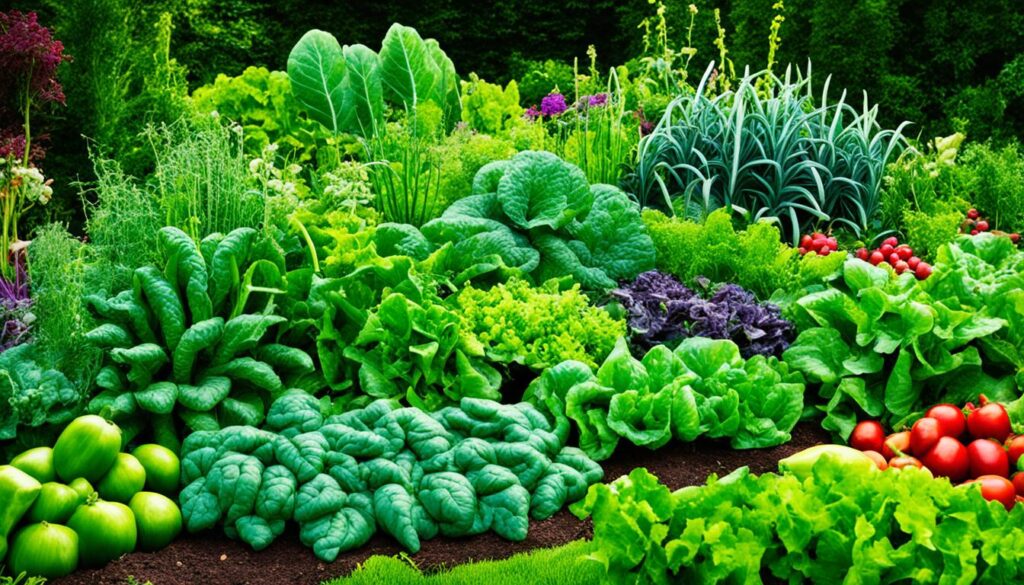
“Growing your own vegetables is one of the most rewarding and sustainable activities you can undertake. It’s a true investment in your health, your wallet, and the environment.”
Cost Savings: Grow Vegetables for Less
Growing your own vegetables can help you save money on groceries. You can skip the high prices at stores by tending to your garden. But, make sure to figure out the costs of your garden, like materials, supplies, and tools.
Estimate Gardening Costs and Yields
To see how much you save by growing your own veggies, track your spending and harvest. This info lets you figure out the cost per vegetable. Then, compare it to what you’d spend at the store. Knowing your costs and harvests helps you get the most out of your garden.
Compare to Grocery Store Prices
Research shows that gardening can be more valuable than buying food, especially if you don’t count labor costs. For instance, growing tomatoes costs about $1.48 per pound, baby spinach $3.33 per pound, and carrots $2.00 per pound. These prices are lower than what you’d pay in stores, saving you money on tomatoes and spinach but not on carrots.
By keeping an eye on your gardening costs and harvests, you can choose which veggies to grow. This way, you’ll save more money on groceries. Gardening can be a wise financial move.
Investing in a vegetable garden is a smart choice. With careful planning, you can enjoy fresh produce and cut down on grocery bills.
Financial Benefits of Vegetable Gardening
Growing your own vegetables can save you money and improve your finances. By tracking your gardening costs and harvests, you can see how much your veggies are worth. Often, what you grow costs less than buying it at the store, giving you a net gain.
This knowledge helps you choose which vegetables to grow, making the most of your gardening efforts. It’s a smart way to invest in your health and wallet.
A recent study found that more people in the U.S. started gardening, especially the young and those with lower incomes. This shows that many see the value in growing their own food.
Studies show that gardening can make you more food secure by giving you fresh fruits and veggies. A survey in New York City found that gardens helped 90% of those struggling with food insecurity get their produce. This proves that gardening can save money and help those in need.
In 2020, over 38 million Americans faced food insecurity, says the USDA. Community gardens helped adults and kids eat more veggies, showing their positive impact. This highlights how gardening can fight food insecurity and make healthy food more affordable.
Community gardens also help the local economy by raising property values and supporting development. This shows how gardening benefits not just your home but the whole community financially.
Conclusion
Vegetable gardening brings many benefits to your life. It makes you healthier with fresh, nutrient-rich home-grown produce. It also helps you save money on groceries.
This activity is good for the planet and teaches kids valuable lessons. It cuts down on food waste and supports a sustainable lifestyle.
Gardening also boosts your mental health. It makes you more connected to nature. If you want to save money, eat better, or just enjoy a hobby, gardening is a great choice.
It saves you money on food and helps with stress and sleep. Gardening offers many benefits for your health, wallet, and happiness. By gardening, you open up new chances to improve your life.
FAQ
What are the health benefits of vegetable gardening?
Growing your own veggies means you get to eat them fresh. This leads to better health and well-being. It encourages eating more fresh, nutrient-rich foods.
How can vegetable gardening save me money on groceries?
By growing your own food, you save money on buying produce. Even a small garden can give you a lot of food. This can cut your food costs by hundreds each year.
How is vegetable gardening an eco-friendly and sustainable activity?
It cuts down on carbon emissions by not needing fossil fuel for transport. Organic gardening also protects the soil, air, and water. It reduces food waste too.
What are the physical and mental health benefits of vegetable gardening?
Gardening is great exercise. It also helps with stress and makes you happier. It’s good for your mind and body.
How can vegetable gardening teach children valuable life skills?
It teaches kids about healthy eating and responsibility. They learn about nature and teamwork. It’s a great way for them to grow.
What are the benefits of growing your own organic, homegrown produce?
You control the food’s quality and how it’s made. Your produce skips processing, transport, and storage. This keeps its nutrients high.
How can I accurately estimate the cost savings from my vegetable garden?
Track your gardening costs and harvest amounts. This lets you see the real cost per vegetable. Then, compare it to store prices to see your savings.
What are the overall benefits of vegetable gardening?
It’s great for your health, wallet, and the planet. It’s a fun hobby that brings joy and a sense of achievement. Vegetable gardening adds value to your life in many ways.

